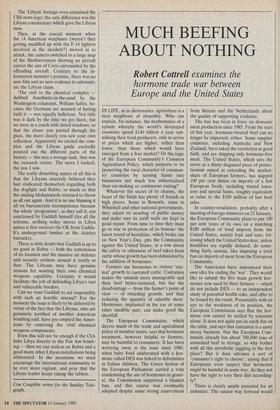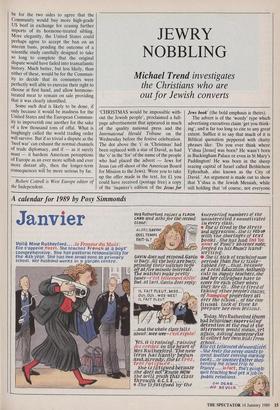MUCH BEEFING ABOUT NOTHING
Robert Cottrell examines the
hormone trade war between Europe and the United States
IN LIFE, as in dictionaries, agriculture is a near neighbour of absurdity. Who can explain, for instance, the mathematics of a system whereby the world's developed countries spend £140 billion a year sub- sidising their food producers, only to arrive at prices which are higher, rather than lower, than those which would have emerged from a free market? Or the,logic of the European Community's Common Agricultural Policy, which purports to be preserving the rural character of commun- ity countries by turning farms into businesses not much less industrialised than car-making or continuous casting?
Whatever the secret of its charms, the beast of the fields has plenty of friends in high places. Some in Brussels, some in Whitehall and other national governments, they adjust its nosebag of public money and make sure its tariff walls are kept in good repair. From time to time they must go to war in protection of its honour: the latest round of hostilities, which broke out on New Year's Day, pits the Community against the United States, in a row about the safety or otherwise of beef taken from cattle whose growth has been stimulated by the addition of hormones.
Farmers use hormones to restore 'nor- mal' growth to castrated cattle. Castration makes the animals more manageable and their beef better-textured, but has the disadvantage — from the farmer's point of view — of retarding growth, and thus reducing the quantity of saleable meat. Hormones, implanted in the ear or some other inedible part, can make good the shortfall.
The European Commission, which directs much of the trade and agricultural policy of member states, says that hormone treatment, however helpful to farmers, may be harmful to consumers. It has been worrying away at the issue since 1980, when baby food adulterated with a hor- mone called DES was linked to deformities in Italian children. The Green faction of the European Parliament carried a vote condemning the use of hormones in gener- al, the Commission supported a blanket ban, and this course was eventually adopted despite some strong reservations from Britain and the Netherlands about the quality of supporting evidence.
The ban has been in force on domestic meat production since 1985. From the start of this year, hormone-treated beef can no longer be imported, either. Some supplier countries, including Australia and New Zealand, have taken the restriction in good faith, and are shipping only hormone-free meat. The United States, which sees the move as a thinly disguised piece of protec- tionism aimed at extending the market- share of European farmers, has slapped 100 per cent duties on imports of a few European foods, including tinned toma- toes and special hams, roughly equivalent in value to the $100 million of lost beef sales.
In counter-retaliation, probably after a meeting of foreign ministers on 23 January, the European Community plans to put 100 per cent taxes of its own on a matching $100 million of food Imports from the United States, mainly fruit and nuts; fol- lowing which the United States may, unless hostilities are rapidly defused, do some- thing fairly serious, like imposing a total ban on imports of meat from the European Community.
The Americans have announced their own idea for ending the 'war'. They would like to submit the five main growth hor- mones now used by their farmers — which do not include DES — to an independent study of potential health risks, and offer to be bound by the result. Presumably with an eye to the weakness of its position, the European Commission says that the hor- mone row cannot be settled by scientists alone. It does not quite put its cards flat on the table, and says that castration is a nasty messy business, that the European Com- munity already has about 700,000 tons of unwanted beef in storage, so why bother with all this metabolic juggling in the first place? But it does advance a sort of `consumer's right to choose', saying that if Europeans even suspect that hormones might be harmful in some way, do they not have the right to vary their diet according- ly?
There is clearly ample potential for an armistice. The easiest way forward would be for the two sides to agree that the Community would buy more high-grade US beef in exchange for ceasing further imports of its hormone-treated sibling. More elegantly, the United States could perhaps agree to accept the ban on an interim basis, pending the outcome of a scientific study carefully designed to take so long to complete that the original dispute would have faded into transatlantic history. Much better, but less likely, than either of these, would be for the Commun- ity to decide that its consumers were perfectly well able to exercise their right to choose at first hand, and allow hormone- treated meat to remain on sale providing that it was clearly identified.
Some such deal is likely to be done, if only because it would be madness for the United States and the European Commun- ity to impoverish one another for the sake of a few thousand tons of offal. What is laughingly called the world trading order will survive. But if so trivial a dispute as the 'beef war' can exhaust the normal channels of trade diplomacy, and if — as it surely must — it hardens American perceptions of Europe as an ever more selfish and ever more distant ally, then the longer-term consequences will be more serious by far.
Robert Cottrell is West Europe editor of the Independent.



















































 Previous page
Previous page